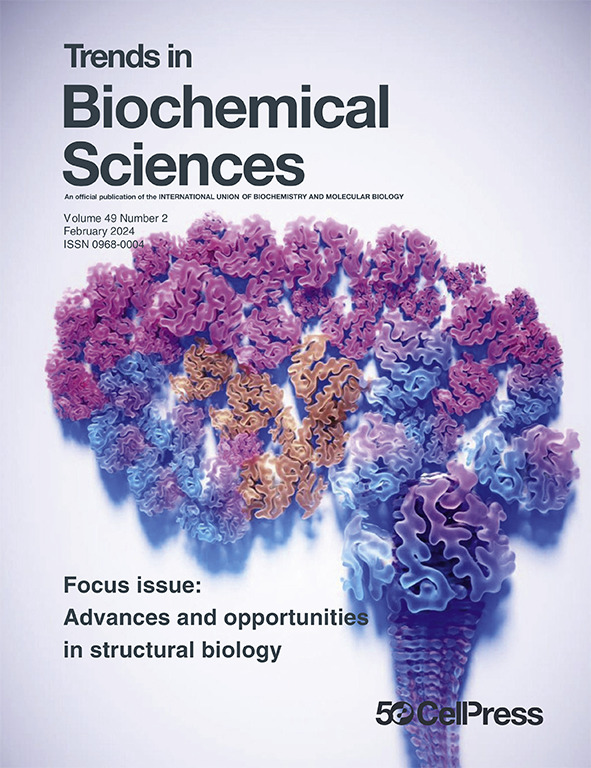依赖 UPS 的蛋白质质量控制降解策略。
IF 11.6
1区 生物学
Q1 BIOCHEMISTRY & MOLECULAR BIOLOGY
引用次数: 0
摘要
由于受损蛋白质极易形成聚集体,因此降解受损蛋白质对组织完整性和生物体健康至关重要。E3 泛素连接酶是蛋白质质量控制(PQC)的关键调控因子,介导受损蛋白质的选择性降解,这一过程被称为 "PQC 降解"(PQCD)。触发 PQCD 的降解信号(degrons)基于通常埋藏在原生蛋白质结构中的疏水位点。然而,一个悬而未决的问题是,PQCD 专化的 E3 连接酶如何区分瞬时错误折叠的蛋白质(可以有效地重新折叠)和永久受损的蛋白质(必须降解)。虽然在降解决定因素的特征描述方面取得了重大进展,但了解细胞和生物体 PQCD 途径的关键调控信号仍然是一项挑战。本文章由计算机程序翻译,如有差异,请以英文原文为准。
UPS-dependent strategies of protein quality control degradation
The degradation of damaged proteins is critical for tissue integrity and organismal health because damaged proteins have a high propensity to form aggregates. E3 ubiquitin ligases are key regulators of protein quality control (PQC) and mediate the selective degradation of damaged proteins, a process termed ‘PQC degradation’ (PQCD). The degradation signals (degrons) that trigger PQCD are based on hydrophobic sites that are normally buried within the native protein structure. However, an open question is how PQCD-specialized E3 ligases distinguish between transiently misfolded proteins, which can be efficiently refolded, and permanently damaged proteins, which must be degraded. While significant progress has been made in characterizing degradation determinants, understanding the key regulatory signals of cellular and organismal PQCD pathways remains a challenge.
求助全文
通过发布文献求助,成功后即可免费获取论文全文。
去求助
来源期刊

Trends in Biochemical Sciences
生物-生化与分子生物学
CiteScore
22.90
自引率
0.70%
发文量
148
审稿时长
6-12 weeks
期刊介绍:
For over 40 years, Trends in Biochemical Sciences (TIBS) has been a leading publication keeping readers informed about recent advances in all areas of biochemistry and molecular biology. Through monthly, peer-reviewed issues, TIBS covers a wide range of topics, from traditional subjects like protein structure and function to emerging areas in signaling and metabolism. Articles are curated by the Editor and authored by top researchers in their fields, with a focus on moving beyond simple literature summaries to providing novel insights and perspectives. Each issue primarily features concise and timely Reviews and Opinions, supplemented by shorter articles including Spotlights, Forums, and Technology of the Month, as well as impactful pieces like Science & Society and Scientific Life articles.
 求助内容:
求助内容: 应助结果提醒方式:
应助结果提醒方式:


